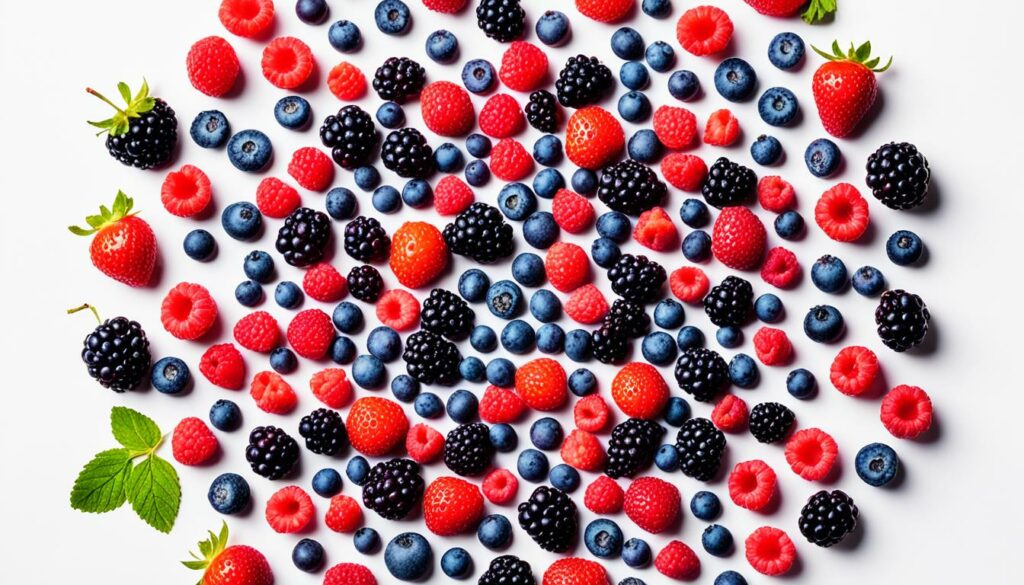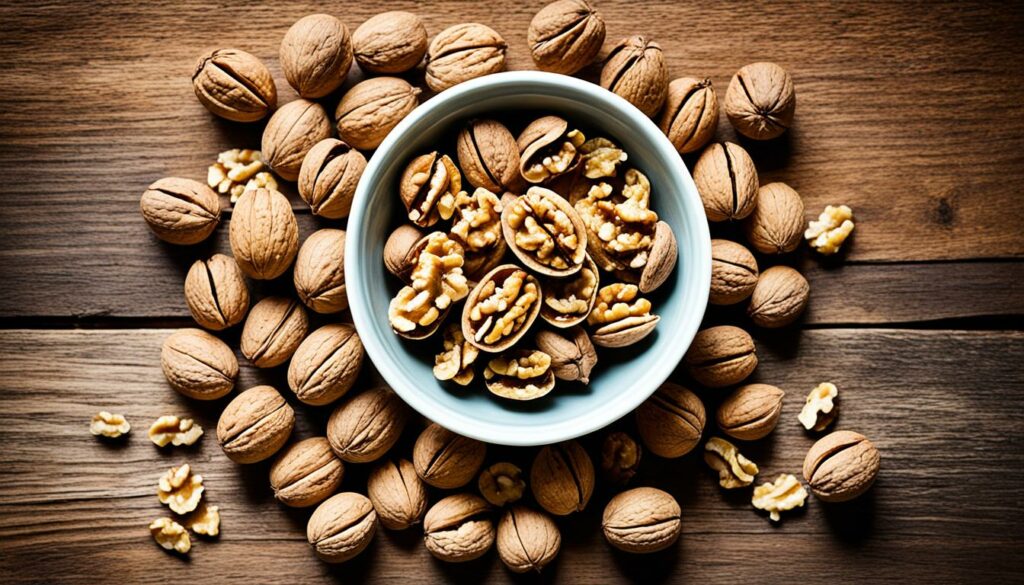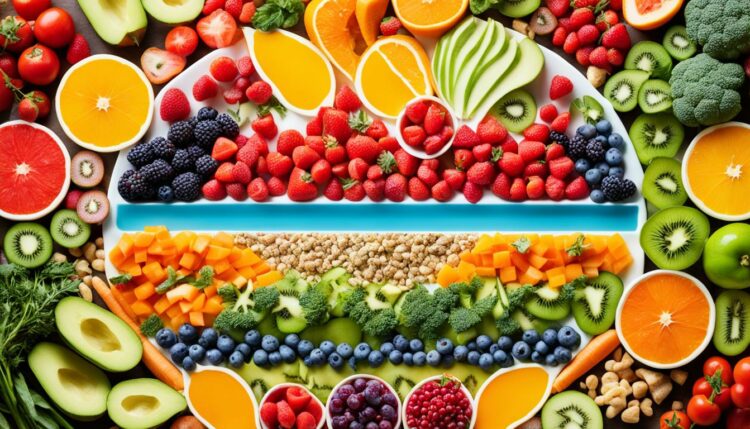Did you know that a varied diet that includes certain foods has been shown to have potential benefits in reducing the risk of cancer?
While no single food can prevent cancer, incorporating evidence-based cancer fighting foods into your diet may help bolster your body’s defenses and promote a cancer prevention diet.
These foods contain nutrients and compounds that have been associated with lower cancer risk and have shown promising results in scientific studies.
Key Takeaways
- Including evidence-based cancer fighting foods in your diet may help to reduce the risk of cancer and promote overall health.
- Apples, berries, cruciferous vegetables, carrots, fatty fish, and walnuts are all examples of foods that have shown promise in scientific studies when it comes to cancer prevention.
- These foods are packed with beneficial nutrients, antioxidants, and compounds that may help inhibit cancer cell growth, reduce tumor formation, and modulate immune responses.
- Incorporating a variety of these foods into a balanced diet can contribute to a comprehensive cancer prevention strategy.
- While diet alone cannot guarantee protection against cancer, adopting a healthy eating pattern that includes these cancer fighting foods is a positive step towards reducing the risk and promoting overall well-being.
Here are 10 evidence-based foods known for their cancer-fighting properties, which can be a valuable addition to a health-focused lifestyle:
- Cruciferous Vegetables (e.g., Broccoli, Cauliflower, Kale, Brussels Sprouts)
- These vegetables are rich in sulforaphane, a compound found to have potent anti-cancer properties. Studies suggest that sulforaphane can inhibit the growth of cancer cells and induce apoptosis (cell death) in tumors. Incorporating these vegetables into your diet can support detoxification processes and offer protective benefits against cancer.
- Berries (e.g., Strawberries, Blueberries, Raspberries)
- Berries are packed with antioxidants, such as vitamin C and anthocyanins, which help reduce oxidative stress and inflammation, lowering the risk of cancer. Regular consumption of berries has been linked to a decreased risk of several types of cancer, thanks to their ability to fight free radicals and prevent DNA damage.
- Turmeric (Curcumin)
- The active compound in turmeric, curcumin, has been extensively studied for its anti-inflammatory, antioxidant, and anti-cancer effects. Curcumin can inhibit the growth of tumor cells and prevent cancerous cells from spreading. Adding turmeric to your diet can enhance your body’s natural defenses against cancer and support overall health.
- Garlic
- Garlic contains allicin, a compound with anti-cancer properties. Research has shown that garlic can reduce the risk of certain cancers, including stomach, colon, esophagus, pancreas, and breast cancer. Its ability to boost immune function also plays a key role in its cancer-fighting capabilities.
- Green Tea
- Rich in polyphenols, especially epigallocatechin-3-gallate (EGCG), green tea is renowned for its cancer-preventive properties. EGCG is a powerful antioxidant that can protect cells from DNA damage caused by free radicals, inhibit tumor growth, and enhance the effectiveness of enzymes involved in detoxification.
- Tomatoes
- Tomatoes are a significant source of lycopene, an antioxidant that gives them their red color. Lycopene has been linked to a reduced risk of prostate cancer. It works by decreasing tumor growth and preventing cancerous cell proliferation. Consuming tomatoes and tomato-based products can contribute to a protective dietary strategy against cancer.
Incorporating these foods into your daily diet can not only support your overall health and vitality but also offer protective benefits against cancer.
Apples: Natural Cancer Fighters
Apples are not only delicious but also packed with health-boosting nutrients. These versatile fruits contain polyphenols, which are plant-based compounds known for their potential anticancer properties.
Studies have shown that apple polyphenols, such as phloretin, may inhibit the growth of breast cancer cells without harming healthy cells. These polyphenols specifically target proteins involved in advanced-stage cell growth, providing a promising avenue for the prevention of cancer development.
Adding apples to your diet can also provide a wide range of other health benefits thanks to their rich nutritional profile. They are a good source of fiber, vitamins, and minerals, making them an excellent choice for overall well-being.
“Apples are rich in polyphenols, which have shown potential anticancer properties.”
So, whether you prefer snacking on a crisp apple or incorporating them into your favorite recipes, these natural cancer fighters are worth adding to your daily menu.
Health Benefits of Apples:
- Rich in antioxidants that help protect cells from damage
- May aid in weight management due to their high fiber content
- Support heart health by reducing cholesterol levels and improving blood pressure
- Contain nutrients that promote good gut health and aid digestion
- May reduce the risk of developing type 2 diabetes
With their myriad of benefits, it’s no surprise that apples are often considered a staple in a healthy diet. Including this versatile fruit in your meals can be a simple yet powerful step toward cancer prevention and overall well-being.
Berries: Antioxidant-Rich Cancer Fighters
Berries are a delicious and nutritious addition to your diet, and they also offer numerous health benefits. These vibrant fruits are packed with vitamins, minerals, dietary fiber, and antioxidants, which make them powerful allies in the fight against cancer.
The antioxidants found in berries, such as anthocyanins and flavonols, help to neutralize harmful free radicals in the body. Free radicals can cause oxidative stress and damage to cells, which can contribute to the development of cancer.
Research has shown that certain types of berries, such as bilberries and lingonberries, contain compounds that have been found to inhibit tumor formation and cancer growth, particularly in digestive tract cancers. These berries have been found to have immune-modifying effects as well, which may aid in cancer immune therapies.
Adding a variety of berries to your diet is a simple and delicious way to boost your antioxidant intake and support your overall health. You can enjoy berries fresh, frozen, or in various dishes such as smoothies, salads, or desserts.
Berries are not only tasty but also offer a wide range of potential health benefits. Incorporating berries, such as bilberries and lingonberries, into your diet may help to inhibit tumor formation and cancer growth, particularly in digestive tract cancers. These antioxidant-rich fruits also have immune-modifying effects, which may be beneficial in cancer immune therapies.
So, when you’re looking for a sweet and nutritious snack, reach for a handful of berries. Your taste buds and your body will thank you!

Benefits of Berries:
- High in antioxidants that help neutralize free radicals
- May inhibit tumor formation and cancer growth in digestive tract cancers
- Have immune-modifying effects that may aid in cancer immune therapies
- Rich in vitamins, minerals, and dietary fiber
- Delicious and versatile, can be enjoyed in a variety of ways
Cruciferous Vegetables: Nutrient-Dense Cancer Fighters
When it comes to cancer prevention, cruciferous vegetables like broccoli, cauliflower, and kale are nutritional powerhouses that deserve a place in your diet. Not only are they packed with essential nutrients, but they also contain a potent compound called sulforaphane, which has shown promise in fighting cancer.
Sulforaphane, present in cruciferous vegetables, has been studied for its potential anticancer properties. Research has demonstrated that this compound can inhibit the growth of cancer cells and induce cell death in colon cancer cells.
Additionally, sulforaphane has been found to reduce breast cancer tumor development, providing potential protection against this prevalent form of cancer.
Adding 3-5 servings of cruciferous vegetables to your weekly meals could have cancer-preventive effects. Not only are these vegetables delicious and versatile, but they are also low in calories and high in fiber, making them an excellent choice for overall health and wellness.
For those looking to incorporate more cruciferous vegetables into their diet, consider roasting them with olive oil and a sprinkle of sea salt for a delicious side dish. You can also blend them into smoothies or add them to soups and stir-fries for an extra boost of nutrients.
“Including cruciferous vegetables in your diet may help reduce the risk of cancer by harnessing the power of sulforaphane.” – Nutritionist Karen Smith
Carrots: Protective Power Against Cancer
Carrots are not only a delicious addition to meals but also a powerful ally in the fight against cancer. These vibrant orange root vegetables are packed with essential nutrients, including vitamin A, antioxidants, and beta-carotene.
Their natural properties make them an excellent choice for promoting a healthy lifestyle and reducing the risk of various types of cancers.
Research suggests that raw carrot consumption may have a significant impact on preventing colorectal cancer. In fact, studies show that regular consumption of raw carrots can reduce the risk of colorectal cancer by 17%. This finding highlights the potential of carrots as a valuable component of a cancer prevention diet.
But their benefits don’t stop there. Carrots have also been associated with a lower risk of other types of cancer, including stomach and lung cancer. Their high antioxidant content helps neutralize harmful free radicals in the body, protecting cells from damage and reducing the risk of cancer development.
Furthermore, carrots have been shown to be particularly beneficial for breast cancer prevention. They contain compounds that have been found to inhibit the growth of breast cancer cells and reduce the risk of tumor formation.
Adding carrots to your diet can be a simple yet impactful step towards reducing the risk of breast cancer.
So how can you incorporate more carrots into your diet? Here are a few ideas:
- Add grated carrots to salads or coleslaw for a crunchy and nutritious twist.
- Include carrots in your stir-fries or roasted vegetable dishes for added flavor and color.
- Snack on baby carrots with hummus or other healthy dips for a satisfying and cancer-fighting snack.
- Blend carrots into smoothies or juices for a refreshing and nutrient-packed beverage.
By making raw carrot consumption a regular part of your diet, you can harness the protective power of these vibrant vegetables and take a proactive approach to cancer prevention.
Fatty Fish: Omega-3 Powerhouse Against Cancer
Fatty fish like salmon, mackerel, and anchovies are excellent sources of omega-3 fatty acids, which have been associated with a lower risk of cancer.
Omega-3 fatty acids are essential nutrients that play a crucial role in maintaining overall health, including reducing inflammation, improving heart health, and supporting brain function.
Studies have found that omega-3 fatty acids from fish may have a protective effect against breast cancer, particularly in Asian populations. The high levels of omega-3 fatty acids in fatty fish can help regulate cell growth, reduce inflammation, and inhibit the growth of cancer cells.
However, more research is needed to fully understand the mechanisms behind this relationship and to determine the optimal intake of omega-3 fatty acids for cancer prevention.
Fish consumption has also been linked to a lower risk of developing colorectal cancer. The omega-3 fatty acids in fish may help reduce inflammation in the colon and inhibit the growth of colorectal cancer cells. Including fatty fish as part of a healthy diet may provide an additional layer of protection against colorectal cancer.
It’s important to note that while fatty fish is a good source of omega-3 fatty acids, it’s crucial to choose fish that are low in mercury and other contaminants. The American Heart Association recommends consuming at least two servings of fatty fish per week as part of a balanced diet.
Walnuts: Nutritional Powerhouses for Cancer Prevention
Walnuts are not just tasty snacks; they are also packed with numerous health benefits, including potential cancer-preventing properties. Research has focused on studying the effects of walnuts on breast cancer prevention, and the results have been promising.

One of the key components of walnuts is pedunculagin, a compound that the body metabolizes into urolithins. These urolithins have been suggested to play a role in preventing breast cancer by suppressing cancerous cell growth.
A trial involving females with breast cancer found that regular walnut consumption resulted in genetic changes associated with the suppression of cancerous cell growth. This indicates that incorporating walnuts into your diet may not only offer cancer prevention benefits but also contribute to overall health and well-being.
Walnuts are also a good source of essential nutrients such as omega-3 fatty acids, antioxidants, and vitamin E, which further contribute to their potential health benefits.
| Key Points |
|---|
| Walnuts contain pedunculagin, which is metabolized into urolithins, compounds that may help prevent breast cancer. |
| Regular walnut consumption resulted in genetic changes suggestive of the suppression of cancerous cell growth in a trial involving females with breast cancer. |
| Walnuts are also a good source of omega-3 fatty acids, antioxidants, and vitamin E. |
Conclusion
When it comes to cancer prevention, incorporating evidence-based cancer fighting foods into your diet can play a vital role in reducing the risk and promoting overall health. Apples, berries, cruciferous vegetables, carrots, fatty fish, and walnuts have all shown promise in scientific studies as part of a cancer prevention diet.
These foods are rich in beneficial nutrients, antioxidants, and compounds that have been linked to inhibiting cancer cell growth, reducing tumor formation, and modulating immune responses.
While no single food can provide complete protection against cancer, incorporating a variety of these foods into a balanced diet can contribute to a comprehensive cancer prevention strategy.
By making healthy eating choices and including evidence-based cancer fighting foods, you can take proactive steps towards reducing the risk of cancer and promoting overall well-being.
Remember to consult with a healthcare professional or registered dietitian to tailor your diet to your individual needs and maximize the benefits of these cancer-fighting foods.
FAQ
Can certain foods help prevent cancer?
While no single food can prevent cancer, incorporating evidence-based cancer fighting foods into your diet may help reduce the risk of developing cancer. These foods contain beneficial nutrients and compounds that have shown promising results in scientific studies.
How can apples help fight cancer?
Apples are rich in polyphenols, plant-based compounds that have potential anticancer properties. Studies have shown that apple polyphenols, such as phloretin, may inhibit the growth of breast cancer cells without affecting healthy cells, suggesting their potential role in preventing cancer development.
What role do berries play in cancer prevention?
Berries, such as bilberries and lingonberries, are packed with vitamins, minerals, dietary fiber, and antioxidants. Research has found that these berries may inhibit tumor formation and cancer growth in digestive tract cancers. Additionally, berries have immune-modifying effects that may support cancer immune therapies.
What makes cruciferous vegetables effective in fighting cancer?
Cruciferous vegetables like broccoli, cauliflower, and kale contain essential nutrients and a compound called sulforaphane, which has potential anticancer properties. Sulforaphane has been shown to inhibit the growth of cancer cells, induce cell death in colon cancer cells, and reduce breast cancer tumor development.
How can carrots help protect against cancer?
Carrots are packed with essential nutrients, antioxidants, and beta-carotene. Research suggests that raw carrot consumption can reduce the risk of colorectal cancer by 17% and may also lower the risk of stomach and lung cancer. Carrots have also shown potential benefits for breast cancer prevention.
What is the connection between fatty fish and cancer prevention?
Fatty fish like salmon, mackerel, and anchovies are excellent sources of omega-3 fatty acids. These fatty acids have been associated with a lower risk of cancer, particularly breast cancer in Asian populations. There is also evidence linking fish consumption to a reduced risk of colorectal cancer, although more research is needed.
Are walnuts beneficial for cancer prevention?
Walnuts have been the focus of studies investigating their potential cancer-preventing properties. They contain a compound called pedunculagin, which metabolizes into urolithins in the body. Urolithins may play a role in preventing breast cancer. In a trial involving females with breast cancer, walnut consumption resulted in genetic changes suggestive of the suppression of cancerous cell growth.
Can a cancer prevention diet solely rely on these foods?
No, a comprehensive cancer prevention strategy should incorporate a variety of evidence-based cancer fighting foods into a balanced diet. While these foods show promising results, they should be part of a broader approach to health and wellness that includes regular physical activity, maintaining a healthy weight, avoiding tobacco, and regularly consulting with healthcare professionals.




